“I didn’t know that this was going to be our last meeting. Whenever I think about that day, I remember the beautiful face of my sister, who would kiss her own hand and then put her hand to the glass to show her boundless love for me. I would then kiss my own hand and put it against her hand. There was glass between our hands, two or three centimeters thick, but the warmth of our affection reached deep into our hearts and ignited a flame in our souls that will last for eternity.”
This is how Taraneh remembers her sister, Mona Mahmoudnejad, a 17-year-old Baha’i who was executed for her religious beliefs in Shiraz on June 18, 1983, along with nine other Baha’i women. Her father also experienced discrimination and arrest for his Baha’i beliefs.
Mona was born September 10, 1965, in the city of Aden in Yemen. The Mahmoudnejad family were living in the town of Lahij as immigrants and were experiencing financial difficulties. Before Mona was born, her mother had lost her second child, a boy, during childbirth due to the negligence of the only doctor in town. The parents did not want the same thing happening to their new baby so they managed to get to Aden even though, at the time, the British were fighting against Yemeni Arabs and martial law had been declared in the region.
Mona’s father, Yadollah Mahmoudnejad, was born in 1932 to a Muslim family in the Iranian city of Tabriz in Azerbaijan province. Everybody called him Jamshid instead of Yadollah. Jamshid converted to the Baha’i religion as a young man and then emigrated to the Arab region.
The family returned to Iran when Mona was four years old. Her father worked in Isfahan, before moving to Kermanshah and Tabriz, and finally settling in Shiraz. Jamshid worked at an optometry practice and then for a radio and TV repair shop. He was working as an accountant when he was arrested.
Mona’s Essay on Freedom
Mona was an eloquent writer and, ever since her childhood, she put her feelings to paper with fluency and candor. She was in the 11th grade of Pirnia High School in Shiraz when her teacher assigned an essay: “The fruit of Islam is freedom and tolerance and whoever has tasted this fruit has benefited from it.”
In her response to the topic, Mona had written: “Freedom is a bright word amongst all the shining words that exist in the world. Human beings have always wanted freedom. Then how was this freedom taken away from them? Why do human beings not have freedom already? Why are there always bullies in the world? Why are there people who use force and commit every kind of injustice to protect their own interests? ... Why don’t you let me be free … to say what I am and what I want and to tell people about my religion? Why don’t you give me the freedom of expression to write in the press and speak on radio and television? Yes, freedom is a divine gift, and we must benefit from this gift as well; but you do not allow it. Why don’t you let me speak freely as a Baha’i?”
Mona’s essay led to havoc in the classroom, when it was read out, and the teacher sent her to the school’s office. The principal and schoolmaster questioned Mona who refused to back down. Her parents were eventually summoned to the school and managed to calm their daughter down.
The Arrest of Mona and Her Father
“They knocked on the door. I asked who it was, but I did not wait for an answer, and immediately opened the door,” writes Mona’ mother, Farkhondeh Mahmoudnejad, in her memoirs. “It was around nine o’clock at night. I saw a number of agents who entered. pushed me and Jamshid aside, and ordered us not to move. Mona was sitting on the sofa and was calmly studying. She was in the last year of high school and was preparing for English exam. Once in a while, when she encountered a problem, she would ask the agents’ permission and [then] asked her question. Eventually the agents got tired and told her to sit down and not to ask any more questions. ‘You are going to go [later], but I have an exam tomorrow,’ Mona said. They said ‘No! You are not allowed to ask any more questions.’ A few agents were busy searching the rooms. I was sure they would take away Jamshid in the end but I never imagined that they would take Mona, too. Jamshid was calmly standing and praying in a corner until the agents came out of the rooms and one of them said: ‘Yadollah Mahmoudnejad and Mona Mahmoudnejad: both of you get ready so we can go.’
“I was very upset. I said: ‘Why her? She is just a child.’ And the agent angrily responded: ‘She is a child? Look what we found in her room.’ (It was Mona’s composition, titled Why I am a Baha’i). Then he added: ‘With this kind of writing, she is going to set the world on fire. A child?’ I pleaded with him not to take her. Meanwhile, Mona, who was changing her clothes came out of the room and said: ‘Mom, why are you pleading [with them]? Did we have contraband at home? Was I a bad girl? They are only taking me because of my beliefs.’”
That night was October 23, 1982. On the same night, 40 other Baha’is were arrested in Shiraz. Mona was the first Baha’i woman who entered the dark hall of the Revolutionary Guards’ detention center in the city. It was around midnight. A few minutes later they brought a number of other Baha’i women into the hall. When these women noticed Mona, they were surprised and asked her “Why you?” In response, Mona only smiled. They all thought that Mona would soon be released.
Interrogations by the Revolutionary Guards
Interrogators were trying to force the detainees to tell them the names of other active members of the Baha’i community in Shiraz and to give information about the community and its organization.
“Throughout all the interrogations, Mona did not say anything, not the names of other members of the community nor the name of their organization,” writes Mona’s mother. “Then one day, when she was blindfolded, they brought in her father who told her: ‘Mona, tell them whatever you know. We don’t have an underground organization. Our organization is religious, not political.’ But Mona continued her silence. The interrogator threatened her with punishment and Mona said that she was ready for punishment. Her father, who was now distraught, told the interrogator: ‘Give me another chance to talk to Mona.’ This time he beseeched Mona: ‘Mona, my dear daughter, talk. Tell them whatever you know.’ And Mona told the interrogator: ‘Then first let me see my father.’ The interrogator removed her blindfold and Mona saw her father. She threw herself into his arms and both shed tears.”
On one occasion, Mona’s mother and her sister Taraneh visited Mona in prison for a few minutes, a visit which her sister described in a note to a friend. “Saturday, November 19. They eventually allowed us to meet without talking. At 1pm we had gone to the meeting place and at 7pm they brought [the detainees]. They stood them in line behind a glass line and we, on the other side, looked at them. I was shedding tears of happiness. Mona signaled me not to cry and I immediately wiped away my tears. I could not tell her that ‘My beautiful, caged bird, my tears are because I am so happy to see you.’ I am sure she understood this but she did not want to see us crying. I stood in front of her. My mother watched her in silence and Mona looked at us and others.”
“[Later in Adel Abad Prison] Mona told her mother that, that day, they had interrogated her from 1pm to 3am after midnight … She had had a very hard day. But Mona didn’t like to talk about her time in the Guards’ prison because her mind was somewhere else; talking about the Guards’ prison took her to a world of slanders, ugly words and improper questions.”
Adel Abad Prison and the Trial
The Baha’i detainees were transferred from the Revolutionary Guards’ detention center to Adel Abad Prison after 38 days. On that day, 40 more Baha’is were arrested in Shiraz, who replaced them in the detention center. After the transfer to Adel Abad, the questioning and the trial of the Baha’is began. The trials were conducted behind closed doors and lasted only a few minutes without the presence of a defense lawyer.
The Baha’i prisoners had decided not to engage in debates in court and to answer the questions directly and briefly, because Hojatolislam Ghazaei, the Shiraz Sharia judge, was insulting and completely averse to listening and if the Baha’is said something he would insult them more. The Baha’is in his courtroom utter no more than a few words in answer to his questions.
In her book, Shiraz Flowers, one of Mona’s cellmates describes what happened at her trial: “When Mona was in the courtroom, Mr. Ghazaei read the indictment that referred to her membership in the Baha’i spiritual assembly. Mona said that ‘after he read my indictment, he asked if I had any objections. I said no, but [that I was not a member of the assembly because I was not yet 21 and one must be 21 to qualify for membership in the assembly. He rejected my answer and started shouting insults. I did not want to argue with him so I did not answer. Eventually he asked: Islam or execution? I really wanted to answer him but, according to promise that we had made [to each other], I did not answer.’’’
The Arrest of Mona’s Mother
On the morning of Thursday, January 13, 1983, Mona’s mother was also arrested during a visit to judiciary officials and the Revolutionary Guards to inquire about her husband and daughter. A few days later, she was transferred to Adel Abad Prison.
Mona was very happy to see her mother. The first night, as she was lay on the floor and her mother slept on the bed, she gently took her mother’s hand and whispered: “I want to ask you for a favor: I don’t want you to kiss me in front of the others, or to show more affection towards me than towards others because I don’t want them to think, even for a moment, that Mona has her mother beside her here while they are alone. You should behave like a mother more to others than to me and it is not important if you do not pay attention to me or you do not walk next to me. Take more care of others.’ Until the day she was released, Mona’s mother no longer kissed her in the prison.
The memories of many Iranian Baha’is are full of stories of of the 17-year-old Mona’s friendship and empathy towards other Baha’i women in the prison. The Baha’is in prison, for example, were generally denied fruit. But when the harvest came and fruits and vegetables were available outside the prison, one non-Baha’i inmate gave some fruit to Nosrat Yaldaie, a middle-aged Baha’i woman. Even though eating this fresh fruit would have been good for her, Nosrat did not eat it and said that she would give it to her youngest cellmate. So she called Mona and gave her the fruit. Mona took it and went away. When she returned, she was carrying a small plate and on that plate lay the fruit, cut into 16 pieces for the 16 Baha’i women in the ward.
The Execution of Mona’s Father
On February 12, 1983, the local newspaper Khabar-e Jonoub published a statement by the Shiraz Revolutionary Court that announced the execution of 22 Baha’is. In an interview with this newspaper on February 22, Hojatolislam Ghazaei, the head of the revolutionary court, confirmed the news and warned other Baha’is that they must convert to Islam “before it is too late.”
The next day, by order of Hojatolislam Zia Mir Emadi, the Shiraz Revolutionary prosecutor, Baha’i prisoners were gathered in a hall. During this meeting, which he called the “ultimatum meeting,” Mir Emadi said that the death sentence for most of them had been upheld by the Supreme Judiciary Council but he had not yet endorsed the sentences. He added that any Baha’i who renounced “Bahaism” and converted to Islam would be freed; otherwise, they would be executed. In the end, none of the Baha’is consented to renounce their religious beliefs and Mir Emadi said: “Alright! The issue is settled. You love to become martyrs and we are ready to kill you.” (Quoted from the book Shiraz Flowers, memoirs of a Baha’i prisoners in Shiraz.)
On March 12, 1983, Yadollah Mahmoudnejad and two other Baha’is, one man and one woman, were executed for refusing to renounce their religious belief. The execution of these three was a prelude to the mass execution of Baha’i prisoners in June 1983.
Mona’s sister Taraneh tells us about that day: “Mother says that on that day, when they were returning to the ward and after I gave them the news about our father’s martyrdom during my visit, all inmates, Baha’is and non-Baha’is, came to soothe her and Mona and to sympathize with them. Some were crying and had become very emotional. Mona said: ‘Please do not cry. I do not feel lonely and I really do believe that you share our sorrow because you are all like my aunts.’ She then pointed to the younger ones and said: ‘You are like my sisters. We must stay as strong as we can and must not let our strength to go away.’ She then started singing prayers and a few other women recited poems and that is how the day unfolded.”
The Execution of Mona
Three months later, Mir Emadi ordered Torabpour, the chief warden of the prison, to give each Baha’i four chances to repent and then to execute them if they refused to renounce their beliefs. Eight prisoners were taken to Torabpour to repent. None did so. Each of these eight prisoners were executed a few days later – along with Mona.
On June 13, Farkhondeh Anvari (Mahmoudnejad), Mona’s mother, was suddenly released. On June 16, six Baha’i men from Adel Abad Prison were executed. On June 18, when Baha’i woman prisoners were lined up to return to their cells after a short visit by their families, the chief warden separated 10 of them, including Mona, from the other Baha’i inmates and took them to another room. The next day the families of these 10 Baha’i women learned that they had been executed.
The families have never received their wills, nor any other note that they might have written before they were executed. They were buried in the Shiraz Baha’i cemetery without the presence or the knowledge of their families. This cemetery was confiscated by the government in 1984 and the gravestones were destroyed at the same time.















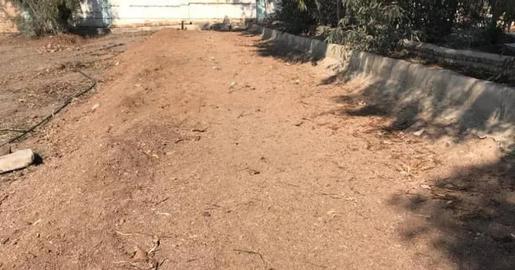
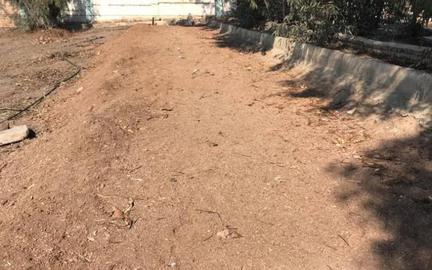

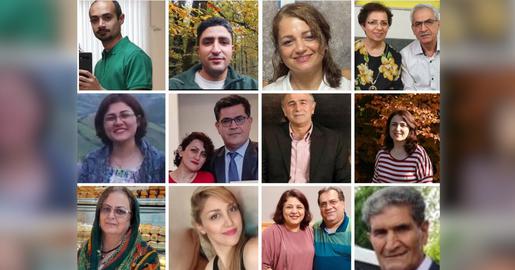
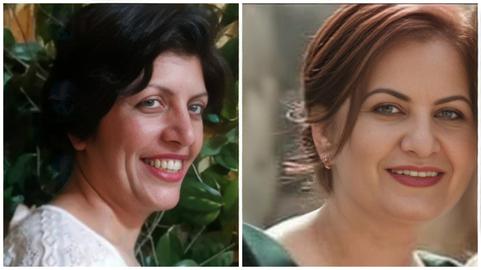

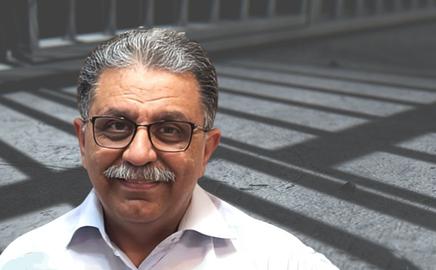

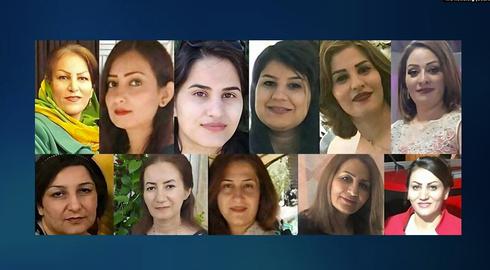
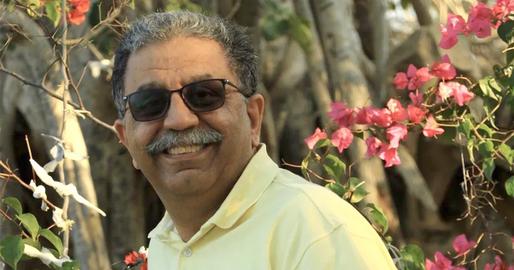


comments